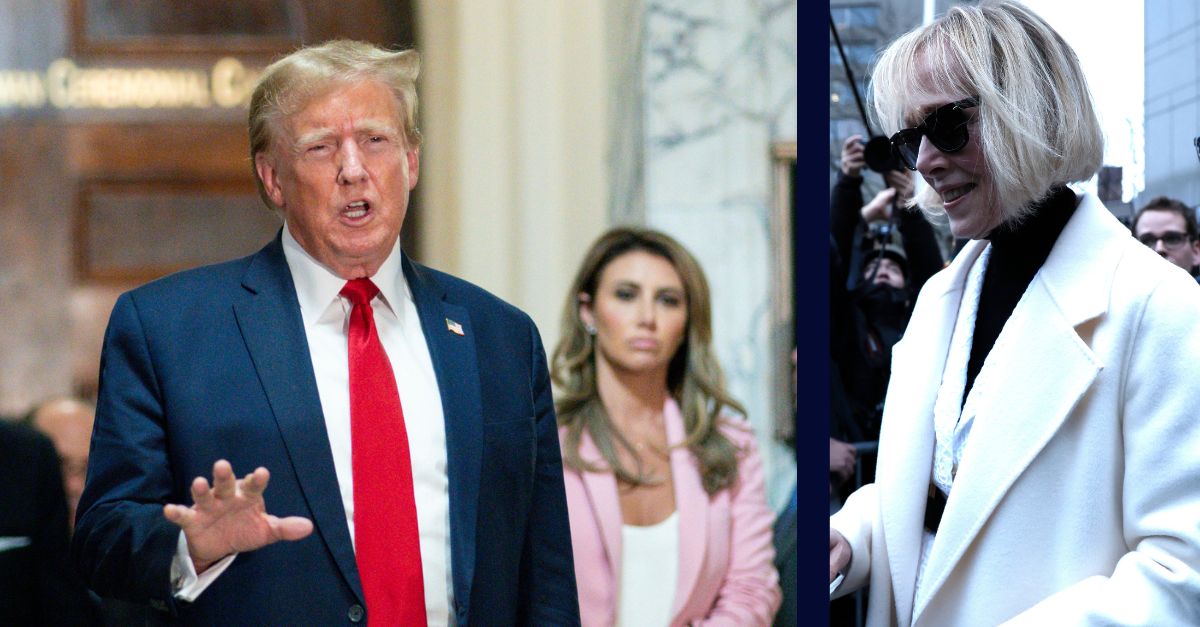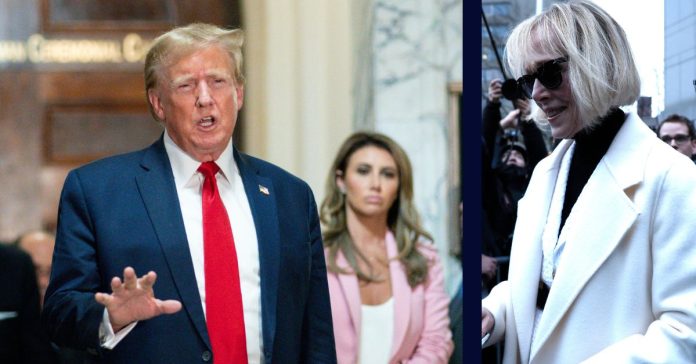
Left: Former President Donald Trump speaks after exiting the courtroom in New York Supreme Court on Dec. 7, 2023. (AP Photo/Eduardo Munoz Alvarez, File)/ Right: E. Jean Carroll leaves federal court following a winning verdict in her defamation of character trial against the former President Donald Trump on Jan. 26, 2024. (John Lamparski/NurPhoto via AP)
While he fights to delay paying $83.3 million for defaming writer E. Jean Carroll, Donald Trump filed a motion for a new trial in New York, arguing the presiding judge “erroneously” limited his testimony about his own state of mind and had “completely muzzled” him at trial.
The 44-page memorandum was expected form the former president as part of a bundle of post-trial motions his attorneys vowed to supply after U.S. District Judge Lewis Kaplan issued the judgment in favor of Carroll.
A new trial is warranted, attorneys for Trump — including Alina Habba and John Sauer — argue, because the court had “erroneously foreclosed” Trump’s testimony about whether he made statements about Carroll with “common law malice” actually meant to injure her.
He had “other motives” [emphasis original] to deny Carroll’s claims that Trump had raped her in a dressing room in the 1990s, the memorandum states.
“This is especially true in a case like this, where President Trump’s statements were defensive, made by a high-profile public figure in response to a highly visible, public accusation of uncorroborated, decades-old alleged wrongdoing,” Habba and Sauer wrote. “Any public figure in such a situation has compelling motivations to deny the allegations for many reasons other than the desire to harm the plaintiff.” [Emphasis original]
The trial in New York that concluded in January was the second defamation case involving Carroll and Trump; the former president had already been found liable for defaming her in 2019 when he openly denied that he had sexually assaulted her. The second trial was only meant to determine what damages Trump owed Carroll, if any.
Trump was disruptive in court, as Law&Crime previously reported, making loud utterances and hurling schoolyard retorts at the judge who finally had to warn Trump that if he continued muttering loudly while Carroll was testifying, he would be thrown out of the courtroom.
“I would love it.” Trump said on Jan. 17. “I would love it.”
Trump was not required to attend, but he did. He was also not required to testify, but he did — for roughly five minutes — and under restrictions set early on in the case.
Due to the fact that Trump had already been found liable for defamation, before trial, Judge Kaplan ordered that Trump could not discuss Carroll’s past romantic relationships, her sexual experiences, or orientation. He could not discuss nor argue his opinion that he did not sexually abuse or rape her. That was a legal finding as many people had commonly understood the word rape, Kaplan ruled. And, further, Trump was told he could not argue that did not act with actual malice when making his comments about her.
In Tuesday’s memorandum, Habba attempted to thread the needle for a new trial by referencing a colloquy that took place moments before Trump would take the stand.
“Did you ever instruct anyone to hurt Ms. Carroll in your statements?” Habba asked.
Trump told Habba “no,” and that he “just wanted to defend myself, my family, and frankly, the presidency.”
This prompted an objection and Kaplan, court records show, ordered the jury to disregard what Trump had said beyond the word “no.”
“This was error and it was prejudicial. For common-law malice, the inquiry is focused on ‘the defendant’s mental state in relation to the plaintiff,”” Habba and Sauer wrote. “Yet the court refused to permit President Trump to testify about his own mental state in making the statements and struck his testimony by addressing whether he made the statements with any ‘malice or ill will directly specifically at plaintiff.’”
Whatever Trump would have said would have been “the most relevant and probative evidence,” they contend.
By “erroneously foreclosing” his testimony on this point, the court would “be assured that the jury would make a baseless punitive-damages award,” the lawyers wrote.
This was prejudicial against Trump and in violation of Second Circuit precedent that allows for a defendant to provide a “comprehensive picture.”
Trump was “completely muzzled,” his lawyers contend.
Concerns that Trump might expose the jury to “inadmissible evidence” were unwarranted, Habba and Sauer contend, noting as well how the judge allowed an “Access Hollywood” tape to be admitted on Jan. 9 because it offered a “unique window into Mr. Trump’s mind provided in his own words and in his own voice.”
That his testimony was cut off but the tape was allowed to be admitted in full “cannot be reconciled,” the memorandum states.
For now, Trump is expected to begin remitting payment to Carroll as soon as next week. His attorneys and Carroll’s attorney Roberta Kaplan have been wrestling over Trump’s bid to stay the payment without posting security to back it up. Carroll’s lawyer has fiercely rejected every attempt and has asked the court to do the same.
Have a tip we should know? [email protected]

